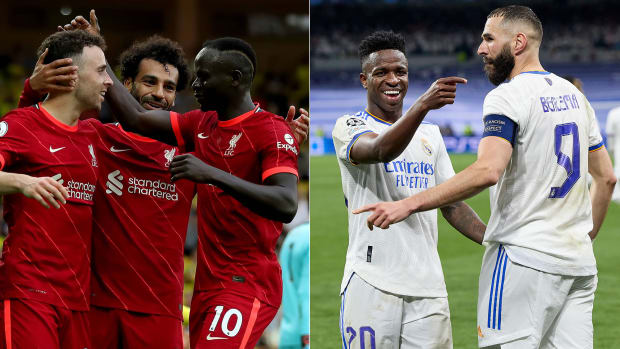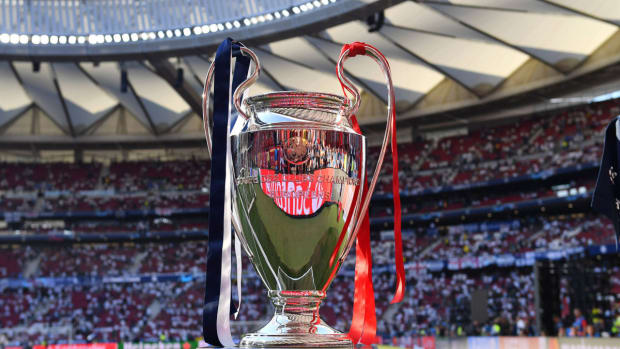One narrowly missed out on a league title. The other was spurned by its long-term, dream transfer target. But salvation awaits in the form of a European championship.
It is, in one sense, a classic Champions League final. Real Madrid against Liverpool. The most successful side the competition had known against the most successful English side. It will be the first matchup to have happened in the final three times; it’s even happened once before in the same city, albeit in a different stadium. Both have already won trophies this season.
Yet for all the success both clubs have enjoyed over the last nine months, both end their seasons facing not just the immediate anticlimax of defeat in a certain sense but also a real specter of disappointment. For Liverpool, that is straightforward enough. This has been an exceptional but exhausting season in which it has played every game it could have possibly played. It won the League Cup and the FA Cup and, but for three goals in a five-minute spell from Manchester City on Sunday, it would have won the league as well. Given that, even then, one goal from Aston Villa would have given Liverpool the Premier League, it’s not unreasonable to say that the prospect of a quadruple remained alive until the final minute of the league season. No English side has ever been so close before. And given all that, were Liverpool to lose on Saturday, a pair of domestic cups would feel like scant reward for such an exceptional season.

Imago Images (2)
For Madrid, the issue is less clearly defined. If it wins, it will have added a 14th European title to its 35th domestic league title which, given the sense of transition it has existed under for a couple of years now, would represent a remarkable season. But if it were to lose against an opponent it also happened to beat in the 2018 final, then the picture, abruptly, looks rather less rosy.
This is an aging squad. Vinícius Júnior and Eduardo Camavinga have had promising seasons, and Rodrygo was the unlikely hero in the shocking semifinal comeback vs. Man City. But there is a need of fresh investment, and the pandemic has had an impact on the budget. And the future of the club, the player on whom so much time and energy has been expended over the past 18 months, Kylian Mbappé, has chosen to stay at Paris Saint-Germain, at least in part because Madrid was unprepared to give up the 50% share of image rights it has regarded as standard. Once, Real Madrid could financially outmuscle pretty much any rival; here, though, was evidence that it cannot compete with PSG. And that, of course, is why it continues to push ahead with plans for a Super League.
Watch the Champions League final online with fuboTV: Start with a 7-day free trial!
That this final is in Paris is of vast symbolic significance, but not just because that is where Mbappé has chosen to stay (and he claims he’ll still be rooting for Real in the final) and—whatever Manchester and Newcastle may have to say—of the petro-takeover of football. It was in Paris in 1955 that the representatives of 18 leading clubs gathered at the Hotel Ambassador, just four miles from the Stade de France, to establish the European Cup. Initially the plan was for a league, but that plan was shelved amid fear for domestic leagues and the two-legged knockout format introduced instead.
The person driving the meeting was the Madrid president Santiago Bernabéu, who insisted on holding the first-round draw there and then, giving the plans the sense of being a fait accompli even though approval had not at that point been given by a skeptical UEFA. Real Madrid, although it is intractably solipsistic and its conduct often laughably self-serving, is now a rare standout in not having been taken over by foreign investors. Even the Ambassador is now a Marriott.

Frank Hoermann/Sven Simon/Imago Images
For Madrid, coming to Paris is a return to the city where the club helped create the competition that, in the late 1950s, made its name as a global force, that established it as the preeminent force in world football. But it finds the city changed; Paris now represents a future in which Madrid may not be dominant, for all its advantages. As a member-owned club, it may represent the past, while the future lies with its opponent, Liverpool, owned by a U.S.-based hedge fund, and with state-run projects such as PSG. How can any institution, no matter how grand, how storied, hope to fight with effectively unlimited wealth?
So far this season, Madrid has beaten the big three petro-clubs (PSG, Chelsea, Man City). It has reveled in what must be the bizarre feeling of being the underdog. But the truth is, it has played like an underdog. There have been periods in all three ties when it was outplayed before the individual brilliance of one or more of Thibaut Courtois, Luka Modrić and Karim Benzema dragged it through. That cannot be sustainable.
Given the quality of the sides it has beaten and of the side it has yet to play, Paris could bring the culmination one of the most glorious of Madrid’s European campaigns. But it should also represent a warning of how Madrid’s position in the game has changed.
More Soccer Coverage:
- Wilson: Intense Drama Defines Premier League’s Last Day
- Wilson: Ancelotti’s Unique Form of Greatness Fits This Real Madrid Group
- Kylian Mbappé Stays at PSG, Snubs Real Madrid
- Gastelum: Lyon Reaffirms Its Place Atop the Women’s Soccer Hierarchy
Sports Illustrated may receive compensation for some links to products and services on this website.